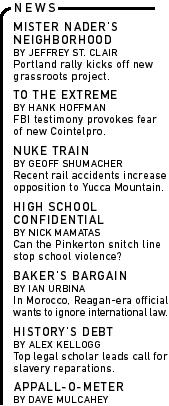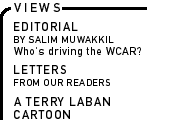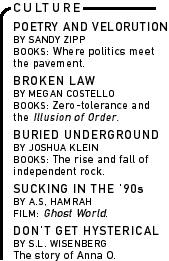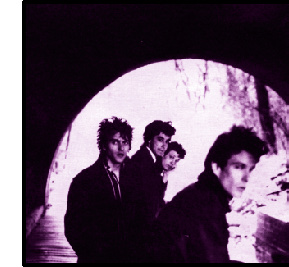|
|

|

|

|
|
|
| |
|
|
|
Our Band Could Be Your Life: Stories from the Michael Azerrad's 1993 book Come As You Are told the tale of Nirvana's exciting rise to prominence, but in retrospect the band's popular breakthrough marked not the beginning of a new era but the end of an old one. Few bands that capitalized on Nirvana's newfound fame lasted through the '90s intact, and most that did seem as boring, banal and insufferable as the '70s cheese-trains punk desperately sought and fought to derail. Sadly, Nirvana's greatest legacy may be its untimely end, not its music. For the perennially stodgy record industry masses and those poor souls that turn to the radio and MTV for guidance, Nirvana's success may have come as a complete surprise, a left-field shock that shook the foundations of commercial music and rewrote the rules of stardom. But for fans of independent music, the band's ascent wasn't so utterly unexpected. The vast underground supports hundreds, if not thousands, of bands constantly on the cusp of mainstream adulation. Fans have seen firsthand what too much fame and fortune can do to their favorite acts, and they pray that their secret won't get out. Of course, some musicians actively seek out fame and fortune. Ambitious artists such
Michael Azerrad's latest book, Our Band Could Be Your Life, takes us back to the vibrant '80s underground explosion. More a series of portraits than a critical analysis, the book nonetheless hints that the rise of the great American independent rock acts of the '80s may have marked the last time the underground would propel pioneering, essential groups to the brink of stardom, all on their own terms. The book basically boils down to thirds: the trailblazers (Black Flag, Minor Threat, Hüsker Dü, the Minutemen), the mavericks (Sonic Youth, the Replacements, the Butthole Surfers, Big Black) and the followers (Mudhoney, Dinosaur Jr.). The last group of musicians arguably benefited the most from the inroads made by the first two, and ultimately set the stage for Nirvana's alt-rock revolution, but the story really lies with their predecessors. Black Flag and Minor Threat were bands of political action. Manifestos in hand, they criss-crossed the country selling a message of freedom and a punk-rock DIY ethos. In Black Flag's case, the California band discovered and codified a network of clubs, cafeterias and other places to play across America, establishing a performance circuit that exists to this day. The Minutemen and Hüsker Dü demonstrated that a totally independent act could make major artistic statements free of any corporate ties, as their ambitious double-albums Double Nickels on the Dime and Zen Arcade (released on the same day in 1984) attest. The Ramones, Sex Pistols and the Clash all benefited from major label attention and big name producers; their DIY counterparts in the '80s, at least initially, did without such support. But once these key inroads were made, the path became much easier for subsequent independent rock excursions. Sonic Youth and the Butthole Surfers might have had it tough at first, but their stubbornly uncommercial music and confrontational performances wouldn't have stood a chance without the strong support network established by their erstwhile peers. Likewise, the Replacements and Big Black, two utterly different bands, had the luxury to indulge one shared trait: a complete and utter disregard for their audience's satisfaction. They didn't give a fuck whether anyone liked them, and sometimes actively tried to alienate their audience. (Azerrad documents the Replacements' disastrous tour opening for R.E.M. and several other intentionally horrible showcases, concerted efforts to turn people off) Like spoiled kids, they too benefited from their parents' hard work. In fact, Azerrad repeatedly refers to the '60s ties of this first wave of American indie acts--that they were the last generation to remember firsthand the rise of the American counterculture and the anti-war movement as well as the British Invasion and the first punk revolution. In many ways the topsy-turvy '90s were more than just a numerical inversion of that decade: Where once the counterculture existed as an alternative to the mainstream, the counterculture became the mainstream. It was a paradox that couldn't last, and 10 or so years after the halcyon days of alt-rock, radio still exists as sort of an identity-less wasteland--in parallel to the so-called Generation Y now in the crosshairs of cool hunters and cultural watchdogs. Yet almost every chapter of Azerrad's book, each dedicated to a specific band, suspiciously ends the same way: self-destruction in the face of stardom, with success the ironic catalyst. Azerrad makes a major tonal mistake by concluding his tome with chapters on Mudhoney (basically the Sub Pop story) and Beat Happening (the K Records story), though one suspects he chose these Pacific Northwest paragons to reiterate the obvious connection to Seattle's Nirvana (the success story). But Azerrad would have been better off finishing with his inspiring chapter on Fugazi. Fugazi's truly alternative model of success--low prices, all-ages shows and completely independent business practices--may prove the way out for so many artists caught in the major-label runaround. The major-label contracts of on-the-cusp bands like Built To Spill but also Pearl Jam are coming up for review, while artists as diverse as Aimee Mann, Beck and Courtney Love have spent the past few years decrying (or escaping) their corporate purse holders. Could another revolution be on the way? Perhaps, but the damage the last decade exacted on the creative community has already been done. If and when somebody decides to write about alternative music in the '90s, the book will not be about support networks and "scenes" but about money. If any one lesson can be taken from the tale of Nirvana, it's that authentic trends are regularly destroyed at the meddling hands of interlopers and exploiters. In the future, everyone will be famous for 15 people," the pop imp Momus has joked, but there's a sad truth to his witty take on Warhol's famous prediction. It has never been easier to record and release your own records, but bit by bit doors have been closed and channels have been blocked (or at least constricted) so that it's harder to make much of an impact. Throughout Azerrad's book, R.E.M. is held up as a small band that made it big through regular channels, but the group's success still seems like it came from good timing and connections as much as immense talent. R.E.M., of course, still exists, but, along with bands like Sonic Youth and Butthole Surfers, they operate at a fraction of the popularity they once enjoyed. That's not necessarily because the bands are no longer making good music or even that fewer people are buying their records; rather, one suspects it's because the major outlets that made them stars have slowly been turning their backs, fans be damned. The title Our Band Could Be Your Life comes from a Minutemen
song describing the passion and devotion music can evoke. Azerrad's
book stands as a reminder that music is indeed often worth fighting
for, and that even the constraints of big corporations can't always
withstand the power of pure adulation and a strong support network.
But is that still true? As labels consolidate, and monopolistic
concert venues and radio stations close ranks, could an independent
label like SST really compete its way into stores across the country?
The answer is a reserved yes. But a bigger concern is whether a
tiny band can still change the face of the world single-handedly.
Unfortunately, the answer to that question is dishearteningly unclear.
Joshua Klein is a freelance writer who lives in Chicago.
|






